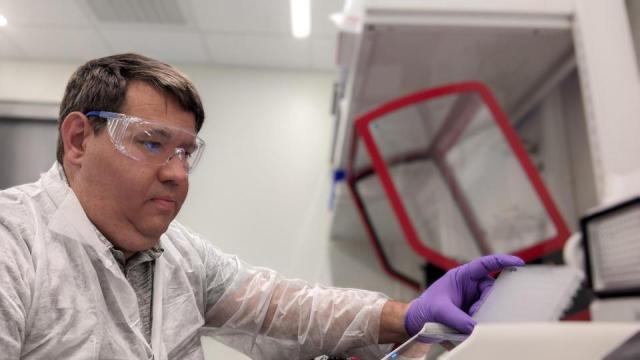Kean Biotechnology Graduate Helps Patients with Genetic Diseases

Growing up on a dairy farm in Wisconsin, Lance Marquardt became interested in science as he watched the impact of selective breeding of cows and crops.
Nearly 30 years later, the Kean graduate has traded the rustic outdoors for work in a lab.
Marquardt, who earned a Master of Science in Biotechnology in 2003, was director of upstream processing gene therapy at PTC Therapeutics in Hopewell, where his work helps those with central nervous system diseases. He was recently transferred to ProBio, Inc., also in Hopewell, in a similar role.
“I like the fact that the products we make are designed to improve someone's life,” said the Bridgewater resident. “And, in the case of gene therapies, we can do that with just one dose of material.”
At PTC, Marquardt and his Upstream Processing team manufactured gene therapies for use in clinical trials. They grew and manipulated cells in a bioreactor, generating viruses that were then purified for use as therapeutic gene treatments to be injected into patients.
On that job and in his current role, he said “we make experimental drugs that will be used to treat patients in clinical trials. Our job is to scale up the process to ensure that adequate material is produced to supply the clinical trials.”
In previous positions, including one at Bristol Myers Squibb (BMS), Marquardt manufactured antibody-based treatments.
Marquardt, who is the father of three teenagers, said he was intrigued by the Kean master’s program partly because he could attend at night. He was part of the first, small cohort of students when the program launched and said it reminded him of the setting at the University of Wisconsin-River Falls, where he had earned a bachelor’s degree in biotechnology in 1996.
Laura Mackey Lorentzen, Ph.D., chairperson of Kean’s Department of Biological Sciences, taught most of the classes in the master’s program. She recalled Marquardt as “a stand-out student.”
“He never missed a class and was the classic overachiever, always either at the top of the course grade-wise or tied for top score,” she said. “In addition, he was the only student to ace both the midterm and final exams.”
Marquardt said he believes his Kean degree has helped him advance within his field.
“In doing my thesis work, I got to collaborate with the process development groups at my company at the time, learning more about how antibodies were being developed,” he said. “It allowed me to be more understanding when a process was developed that was more challenging for us on the manufacturing floor.”
Norm Stoffregen was Marquardt’s boss at both BMS and PTC.
“In nearly a decade since meeting Lance,” he said, “I can confidently rely on him to accept a process or operational challenge and drive toward a solution that produces a robust manufacturing process. That, in turn, produces high-quality products for our patients.”
Marquardt credits Kean with providing opportunities for him to give back to the scientific community. From 2010 to 2014, he served as an adjunct professor for a bioethics course that was part of Kean’s master’s program in biotechnology.
“It gets you thinking about the ultimate impact of what you do,” he said. “We're making something that's going into patients, and while we hope it will improve their health, we have to make sure that, above all, it’s not going to make their condition worse.”
Marquardt also volunteered at an alumni speed networking event for Kean sciences/health professions students in March.
“The most common advice I gave was to make sure you get to know people at your work who are outside your group,” he said, “because you never know when that might open up opportunities in the future.”